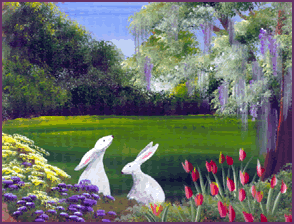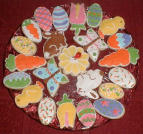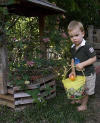|
SOPHIA - 15
(Synopsis: Matt & Sarah learn about a Christian Easter from school, but G-Ma also teaches them how other religions celebrate Easter. She teaches them the history of the Easter Egg Hunt, and where Peter Rabbit came from. Most importantly, she reminds the reader of the importance of Vigilance, and how we can all elect to throw the "rotten eggs of Terrorism" out of our lives!) HERE COMES PETER COTTONTAIL
By “G-Ma, why is that woman bus driver
talking to you. We don’t know her,” questioned my three-year-old
granddaughter, Sarah. As we quickly parked ourselves in an available
seat, I breathed a sigh of relief we were lucky enough to find one
available. I readjusted the strap of my
overstuffed backpack full of G-Ma stuff—extra changes of clothing in case
of potty accidents, juice, a small first aid kit, extra jackets if it got
cold, umbrellas, books for the kids to read if they got bored, crayons and
paper, safety pins and rubber bands, a Balance
Bar for emergency feeding in case of hunger attacks and, some secret money
in case a pick pocket struck—and, of course, thirty-four pound Sarah. As
usual, we were precariously perched on the edge of the seat near the
crowded aisle. With the pack and Sarah, we were crammed tightly in the
small space, the woman next to us not giving an inch of her territory. Sarah squeezed my hand as the mom and girl left
the bus. “She knows that mommy and girl, G-Ma. She knows everybody.” “She may not know all their names, little
one, but she knows they are people like her who like to feel good about
themselves and others but they get in such a hurry they forget to
remember about being happy. She reminds everybody she cares about them.
She puts a smile on grumpy faces. Our driver is a very special driver.”
I gave my little lamb an extra squeeze exchanging glances with the driver
who, overhearing my adulations, glanced at us in the rear view mirror. I
dubbed her the Bus Driver Of Vigilance, there to bring out the best in the
worst, and to draw smiles from grumps.
“Here comes Peter Cottontail hopping down the bunny trail. Hippity Hoppity …. Easter’s on its way…….” Sarah’s falsetto Voice wafted through the crowded bus competing with the cacophony of sirens, horns, trucks growling up the street, and the hissing of the pneumatic shocks that made the bus “kneel” to one side when it came to a stop to load passengers. She swayed in my lap to her own music, oblivious of the jammed bodies around us. When she got to the words we hadn’t learned yet, she hummed a few more bars, reminding me to get busy so we could learn the entire song before Easter. “G-Ma, the driver is a friend of Jesus.”
Sarah’s comment came out of the blue, as that of most three-year olds. The
woman next to me stiffened. “Ms. Matta said Jesus teaches us how to be
nice to people and that’s why he died and came back so He could be our
teacher. That’s really what Easter is about, G-Ma. About Jesus. That’s
what my teacher said.” I was relieved when we reached
our stop. “Race you G-Ma,” Sarah screeched. “Wait,”
I demanded, uneasy about her darting away from me, “until we reach your
block. Then we’ll race.” Matt’s mother had picked him up from his kindergarten class and we arranged to meet at home. “Hang up your coat, Sarah. I see Matt has already put his away.” I usually had to remind my little bunny rabbit but Matt, a potential neat-freak like his mommy (and his G-Ma), was smiling at me, his blue eyes agleam, knowing his attention to even this small task would please me. “G-Ma, I have something to show you, from
school, some art work I did in my art class.” Matt dragged his heavy
dinosaur backpack over to the couch as we all plopped down to relax.
“Look at this” he pulled out a drawing he had made of the crucifixion.
I decided this would be a good time to talk
about the upcoming season so I bribed Matt and Sarah back onto the couch
with cookies and juice. I had done my homework and looked up the history
on the internet, and was eager to share it with the children. “Way back in history, Easter was originally a pagan, that is, a non-Christian or nature festival. Over 2000 years ago, Christian missionaries--people who spread the word of Jesus-- allowed the people to continue to celebrate pagan feasts. The pagan nature festive of Eastre, spelled E-A-S-T-R-E occurred at the same time of year as our Christian observance of the Resurrection of Christ. Over time, the festival was changed into a Christian celebration as more pagans became Christians. The name Eastre was changed to our spelling of today which is - - - Matt?” I waited. He sang out the letters right on cue. “E-A-S-T-E-R,” Matt proudly yelled out. He’d been receiving perfect grades on his school spelling tests. “100% Matt, good work.” I complimented him per usual and continued. “In the year A.D.325,--that’s 325 years after Jesus died-- emperor Constantine, an emperor is similar to a king, at the Council of Nicaea issued the Easter Rule which made the celebration of Easter on a Sunday between the dates of March 22 and April 25. (To tell them the Easter Rule stating that Easter shall be celebrated on the first Sunday that occurs after the first full moon on or after the vernal equinox would be too complicated an explanation, I thought. Even what I told them was a lot, but Matt and Sarah were good with dates—they knew when the dinosaurs became extinct—65 million years ago.) “Besides Jesus’ death and resurrection--his
rising from the dead like the ‘game’ you two were playing--what else can
you tell me about Easter? Do all people celebrate Easter like we
Christians? Matt leaped at the chance to show off his
knowledge. “G-Ma, you know the Jewish people have “Matt and Sarah, Passover is from a Hebrew word
‘Pesach’, meaning ‘passing over’ or ‘protection.’ It comes from the
instructions given to Moses by God. Over 3000 years ago the Israelites
were enslaved by the Egyptians. “I want to know, what the bugs were, my teacher told me about the bugs,” Sarah stopped hopping and curled up on my lap. Her rich chocolate eyes danced in the light. I had done my preparation on the Internet and parroted ‘blood, frogs, lice, wild beasts (flies), blight (cattle disease), boils, hail, locust (like grasshoppers), darkness and the slaying or killing of the First Born’ are the plagues with which God punished the Pharaoh and his people. To protect the Israelites from the death of their first-born, they were told to mark their houses with lamb’s blood so God could identify and “pass over” their homes.” I had the full attention of both children now.
“G-Ma, what happened next? Did the ‘Israels’ get free”? Matt didn’t like
stories in which people were hurt. His face showed the pain within. “I want to know about Peter Cottontail, G-Ma, and the Easter Bunny.” Sarah, her music buttons pushed on again, started to hum. “Are we having an Easter Egg hunt this year in our back garden?” She blinked her eyes and gave me that look that melts any G-Ma’s heart. “Your mommy is having all your relatives over
again this year and you will undoubtedly have a special Easter Egg
hunt.” I thought for a minute.
“I never heard her call it that, but maybe she did when she was a little girl.” I gave my informed little man an extra hug. “The children would build their nest in a hidden place in the home, the barn or the garden. Boys would use their hats and girls their bonnets to make the nests. It was years later that Easter baskets were used.” “Oh! Here comes Peter Cottontail, Hoppin’ down
the bunny trail, Hippity hoppity Happy Easter Day.” Sarah
belted out her seasonal song much to her brother’s dismay. “G-Ma-a-a-a-a!” Sarah screeched. “Make him stop. Matt!!” I changed the subject so I wouldn’t have to
referee the spat. “We’ll have to make our
“O.K. I’ll tell you what I know about Easter
Eggs. The exchange of eggs in the springtime is a custom centuries old.
From the earliest times, the egg was a symbol of rebirth in most
cultures. Eggs were often wrapped in gold (leaf) or brightly colored by
boiling them with the leaves of petals of certain flowers. Matt was equally armed with
his form of retaliation. “I remember that story. Brook
has it. It’s the one where a brother and sister take some of the
eggs they find at the Easter Egg
hunt out of their baskets and hide them again for the littler critters.”
Matt paused, his eyes sparking with an idea. “ Sarah, we can do that for
our little cousins when we have our East Egg hunt. “Yes, Matt, that is a
good idea.” I heard the
unexpected words trill from Sarah’s mouth. “But we can’t give them our
special family eggs we’re coloring with G-Ma. Is G-Pa going to help us
this year, G-Ma? “Oh, Sarah, G-Pa will want to carve an egg out of wood. That’s what he will want to make. Right G-Ma?” Matt, as usual was right on target. G-Pa was in fact ‘in to’ wood carving. “Maybe he can make our cousins eggs too,” Matt asked. Matt’s vigilance in knowing what people liked and disliked was an important part of who he was. He was already a caretaker, a mini follower of Jesus in his heartfelt interest in his fellow brothers and sisters. He and his sister, Sarah, are the fortunate recipients of the love and respect from Parents of Vigilance and from Grandparents of Vigilance. What a beautiful and loving world, I thought, if all parents threw away the rotten eggs of complacency and fear and intimidation. Together, we could all throw away the erosive eggs of any and all Terrorism that stood in the way of families and all fully enjoy the beauty of new birth and resurrection. If all parents did this, we as a country, as a world, would no longer permit ourselves or our children to be enslaved by fear and terror that stifled the growth of our children. Our Vigilance would part the somnolent sea of complacency and free us all. We would all, especially the amazing warm-hearted bus driver, truly celebrate the Easter Season if that happened. “Someone’s at the door, G-Ma! Is it G-Pa? It is! G-Pa come in and help us plan our Easter egg coloring.” Both Matt and Sarah ran to the door to open it for their grandpa, a Grandparent of Vigilance. “Rooooaaarrrr” boomed
G-Pa. And our little lambs ran to hide from him laughing
all the way.
|



 I planned on talking to both Sarah and her five-year-old brother,
Matt, about ‘their takes’ on Easter. Sarah’s elucidation
about Jesus being a teacher was a direct benefit of her seven
months at same institution that her brother had attended for
two years before he graduated to kindergarten.
I planned on talking to both Sarah and her five-year-old brother,
Matt, about ‘their takes’ on Easter. Sarah’s elucidation
about Jesus being a teacher was a direct benefit of her seven
months at same institution that her brother had attended for
two years before he graduated to kindergarten. 

 Before I could even think of an appropriate
response, Sarah also got down on the floor and both of my little Easter
lambs were ‘playing Jesus’. Their mother accustomed to their creativity
didn’t bat an eye on her way out the door. “Adam played ‘Jesus’ last
Easter, mom. Now the two of them are at it,” she said, smiling and
winking as she left.
Before I could even think of an appropriate
response, Sarah also got down on the floor and both of my little Easter
lambs were ‘playing Jesus’. Their mother accustomed to their creativity
didn’t bat an eye on her way out the door. “Adam played ‘Jesus’ last
Easter, mom. Now the two of them are at it,” she said, smiling and
winking as she left. religious holiday and we remember how Jesus dies
for us and rose again.” Sarah hopped off the couch and repeated ‘playing
Jesus.’ “Like this, G-Ma, like this.” She returned to the couch to
cuddle. I loved the innocence of their interpretation, and figured if
Jesus was watching, He would too.
religious holiday and we remember how Jesus dies
for us and rose again.” Sarah hopped off the couch and repeated ‘playing
Jesus.’ “Like this, G-Ma, like this.” She returned to the couch to
cuddle. I loved the innocence of their interpretation, and figured if
Jesus was watching, He would too. Or are there other ways?” Matt’s and Sarah’s parents are
ecumenical and realistic and at least Matt knew there were other belief
systems that needed to be respected.
Or are there other ways?” Matt’s and Sarah’s parents are
ecumenical and realistic and at least Matt knew there were other belief
systems that needed to be respected. Passover at the same
time as Easter. Mommy told me she went to a special dinner called a
‘sadar’ when she lived in California. You told Sarah and me what Easter
means, but I don’t know what Passover means.” Matt scooted over a bit to
make more room for Sarah who was still not ready to quietly sit down
listen. She was hopping around, throwing glances my way.
Passover at the same
time as Easter. Mommy told me she went to a special dinner called a
‘sadar’ when she lived in California. You told Sarah and me what Easter
means, but I don’t know what Passover means.” Matt scooted over a bit to
make more room for Sarah who was still not ready to quietly sit down
listen. She was hopping around, throwing glances my way. Moses, a simple Jewish shepherd, was
instructed by God to go to the Pharaoh—he’s like a king--and demand the
freedom of his people. The Pharaoh wouldn’t pay any attention to Moses’
request to free the Jews. So God unleashed a series of 10 terrible
plagues, sicknesses, on the people of Egypt.”
Moses, a simple Jewish shepherd, was
instructed by God to go to the Pharaoh—he’s like a king--and demand the
freedom of his people. The Pharaoh wouldn’t pay any attention to Moses’
request to free the Jews. So God unleashed a series of 10 terrible
plagues, sicknesses, on the people of Egypt.” “But, G-Ma, what or who got passed over.
I want to know that,” Matt insisted.
“But, G-Ma, what or who got passed over.
I want to know that,” Matt insisted. “Well, kids, it wasn’t until after the last plague that the
Pharaoh finally agreed to free the Israelites. Even though
they were free, Pharaoh’s army chased them through the desert
towards the Red Sea. It looked bad for them. They were
trapped. The sea blocked their escape. Then God worked
a miracle and the waves of the Red Sea parted and the Jews were
able to cross to the other side. Passover celebrates this
history.
“Well, kids, it wasn’t until after the last plague that the
Pharaoh finally agreed to free the Israelites. Even though
they were free, Pharaoh’s army chased them through the desert
towards the Red Sea. It looked bad for them. They were
trapped. The sea blocked their escape. Then God worked
a miracle and the waves of the Red Sea parted and the Jews were
able to cross to the other side. Passover celebrates this
history.  The first two nights of the eight-day holiday are celebrated
with meals called Seders--like the meal your mommy went
to-- at which the stories of Passover are celebrated. So, you
two little lambs can see there are different ways for people
of different faiths or religions to celebrate Easter.”
The first two nights of the eight-day holiday are celebrated
with meals called Seders--like the meal your mommy went
to-- at which the stories of Passover are celebrated. So, you
two little lambs can see there are different ways for people
of different faiths or religions to celebrate Easter.”
 “Let’s start with the
Easter bunny first, kids. The Easter bunny seems to have its origins in
Germany, where it was first mentioned in German writings in the 1500’s –
over 500 years ago. It was introduced to Americans by the German settlers
who arrived in the Pennsylvania Dutch country during the 1700’s. They
called it “Oschter Haws.” Children believed if they were good, the
“Oschter Haws” would lay a nest of colored eggs.”
“Let’s start with the
Easter bunny first, kids. The Easter bunny seems to have its origins in
Germany, where it was first mentioned in German writings in the 1500’s –
over 500 years ago. It was introduced to Americans by the German settlers
who arrived in the Pennsylvania Dutch country during the 1700’s. They
called it “Oschter Haws.” Children believed if they were good, the
“Oschter Haws” would lay a nest of colored eggs.” “G-Ma,
your mommy is German, right?” questioned Matt. “Does she
call the Easter Bunny an ‘Oshteraws?”
“G-Ma,
your mommy is German, right?” questioned Matt. “Does she
call the Easter Bunny an ‘Oshteraws?” Easter cookies soon, and dye
our Easter Eggs. This year we get to make a special egg for your
new brother or sister inside your mommy’s tummy.”
Easter cookies soon, and dye
our Easter Eggs. This year we get to make a special egg for your
new brother or sister inside your mommy’s tummy.” They didn’t
have the coloring kits like the ones we have today. We’ll have to get out
the Easter books your mommy put away after last Easter and enjoy reading
them. Matt, you will be able to help me read this year.” Matt’s reading
was constantly improving and he was even starting to enjoy it when I asked
him to take a page or two or a word here and there.
They didn’t
have the coloring kits like the ones we have today. We’ll have to get out
the Easter books your mommy put away after last Easter and enjoy reading
them. Matt, you will be able to help me read this year.” Matt’s reading
was constantly improving and he was even starting to enjoy it when I asked
him to take a page or two or a word here and there. “G-Ma
read me the Little Critter book about Easter, Matt,” Sarah boasted,
always trying her one upmanship on her brother.. “We went to
the book store yesterday.” Sarah was on the verge of ‘naa-naa-nee-naa-naa-ing’
Matt.
“G-Ma
read me the Little Critter book about Easter, Matt,” Sarah boasted,
always trying her one upmanship on her brother.. “We went to
the book store yesterday.” Sarah was on the verge of ‘naa-naa-nee-naa-naa-ing’
Matt. Let’s do that,
Sarah.” Matt’s Voice rose in the excitement.. Just like his mother, he
thrived on going the extra mile of thoughtfulness of others. I wasn’t
sure Sarah would go along with his charitable suggestion.
Let’s do that,
Sarah.” Matt’s Voice rose in the excitement.. Just like his mother, he
thrived on going the extra mile of thoughtfulness of others. I wasn’t
sure Sarah would go along with his charitable suggestion. He’s never helped before. I want him to be there for
the eggs. We can make a special monster egg if he helps, can’t we? It
will be fun.”
He’s never helped before. I want him to be there for
the eggs. We can make a special monster egg if he helps, can’t we? It
will be fun.” I started to hum “Here come Peter Cottontail…” and heard an
answering melodic response from Sarah as G-Pa followed the sounds
to find our dear bunnies—protected by Parents and Grandparents
of Vigilance who hoped that Easter would be the rise of Vigilance
and the death of Terrorism.
I started to hum “Here come Peter Cottontail…” and heard an
answering melodic response from Sarah as G-Pa followed the sounds
to find our dear bunnies—protected by Parents and Grandparents
of Vigilance who hoped that Easter would be the rise of Vigilance
and the death of Terrorism.